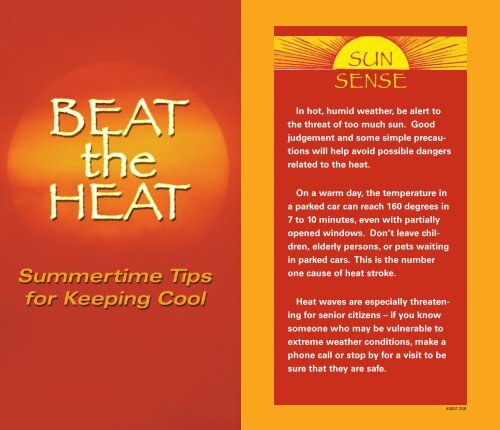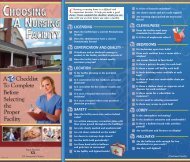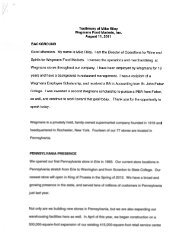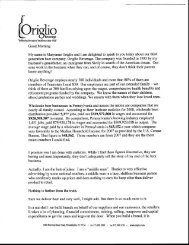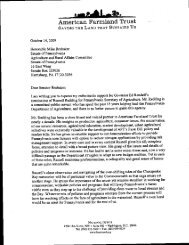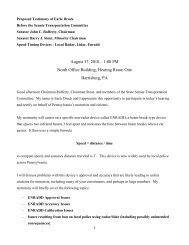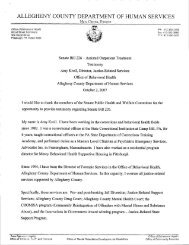Beat the Heat Brochure
Beat the Heat Brochure
Beat the Heat Brochure
Create successful ePaper yourself
Turn your PDF publications into a flip-book with our unique Google optimized e-Paper software.
In hot, humid wea<strong>the</strong>r, be alert to<br />
<strong>the</strong> threat of too much sun. Good<br />
judgement and some simple precautions<br />
will help avoid possible dangers<br />
related to <strong>the</strong> heat.<br />
On a warm day, <strong>the</strong> temperature in<br />
a parked car can reach 160 degrees in<br />
7 to 10 minutes, even with partially<br />
opened windows. Don’t leave children,<br />
elderly persons, or pets waiting<br />
in parked cars. This is <strong>the</strong> number<br />
one cause of heat stroke.<br />
<strong>Heat</strong> waves are especially threatening<br />
for senior citizens – if you know<br />
someone who may be vulnerable to<br />
extreme wea<strong>the</strong>r conditions, make a<br />
phone call or stop by for a visit to be<br />
sure that <strong>the</strong>y are safe.<br />
#4001 208
Know your limits when dealing with <strong>the</strong> HEAT!<br />
<strong>Heat</strong> stress is most likely to happen<br />
when temperatures reach 90 degrees<br />
and remain that way for two days<br />
or more. High humidity conditions are<br />
ano<strong>the</strong>r contributing factor. Those most<br />
at risk are older people in non-air conditioned<br />
surroundings, people with disabilities,<br />
overweight or underweight people on<br />
certain medications, and <strong>the</strong> very young.<br />
Under <strong>the</strong> right combination of heat,<br />
humidity, and activity, even <strong>the</strong> best<br />
athlete can suffer from heat stress.<br />
• Dizziness<br />
• No Sweating<br />
• Rapid Heartbeat<br />
• Chest Pain<br />
• Diarrhea/Cramps<br />
• Weakness<br />
• Nausea<br />
• Breathing Problems<br />
• Headache<br />
• Confusion<br />
is <strong>the</strong> best approach in dealing with heatrelated<br />
problems. Knowing what to do when a heat wave<br />
hits can help avoid potential summertime dangers. These<br />
simple tips from <strong>the</strong> Pennsylvania<br />
Department of Health can help to keep<br />
you cool and safe:<br />
• drink plenty of water and o<strong>the</strong>r liquids,<br />
but avoid those with alcohol or caffeine<br />
• avoid long periods in <strong>the</strong> direct sun or in<br />
unventilated rooms<br />
• avoid vigorous activity when it is hot and humid<br />
• keep air conditioning or fans running<br />
• wear light-colored, lightweight, loose-fitting clothing<br />
• wear a hat or o<strong>the</strong>r head covering when out in <strong>the</strong> sun<br />
• take frequent cold baths or showers and remain in a cool place<br />
• take frequent trips outside to cool off when in a crowded<br />
environment<br />
• wear appropriate sunscreen protection<br />
can occur in a young healthy adult doing<br />
hard work or athletics in <strong>the</strong> heat and sun. The most common<br />
symptoms are:<br />
• an elevated temperature of about 102 degrees<br />
• an increased pulse and breathing rate<br />
• moderate to severe cramping in <strong>the</strong> arms, legs<br />
and shoulder muscles<br />
• a sense of generalized weakness and headache<br />
• heavy perspiration and flushed skin<br />
The muscle cramps can be relieved by gentle massage or having<br />
<strong>the</strong> individual drink a salt solution consisting of one teaspoon of salt<br />
dissolved in one quart of water. Give sips. If nausea occurs, discontinue.<br />
is progressively more serious than heat<br />
cramps, and results from excessive loss of both water and salt.<br />
The symptoms are:<br />
• body temperature of about 104 degrees, although normal temperature<br />
is possible<br />
• headache, vomiting, and dizziness<br />
• fainting may occur<br />
• skin is flushed and damp, but may be cold, pale and clammy<br />
• weak pulse<br />
If heat exhaustion occurs, remove <strong>the</strong> person from <strong>the</strong> heat and<br />
humidity. Loosen clothing, apply cool wet cloths and give sips of<br />
water. If vomiting prevents fluid intake, discontinue – IV <strong>the</strong>rapy<br />
may be necessary. If left untreated, heat exhaustion may progress<br />
to heat stroke. Seek immediate medical attention.<br />
is a true medical emergency requiring<br />
prompt, life-saving action.<br />
Classic symptoms include:<br />
• body temperature greater than 105 degrees<br />
• hot dry skin due to <strong>the</strong> body’s inability to<br />
remove heat through sweating<br />
• rapid strong pulse<br />
More severe symptoms are:<br />
• delirium<br />
• unconsciousness<br />
• hallucinations<br />
• muscle rigidity<br />
• seizures<br />
When any symptoms occur, <strong>the</strong> individual should be taken to<br />
a hospital emergency room for treatment. Call 911 immediately.<br />
Do not give fluids.<br />
<strong>Heat</strong> stroke may fall in two categories based upon <strong>the</strong> age<br />
and activity level of <strong>the</strong> individual.<br />
Classic <strong>Heat</strong> Stroke occurs more often in <strong>the</strong> elderly or<br />
chronically ill who are unable to rid <strong>the</strong>ir body of heat due to<br />
<strong>the</strong>ir age or level of infirmity.<br />
Exertional <strong>Heat</strong> Stroke occurs more often in healthy individuals<br />
who engage in strenuous work or activity in a hot and<br />
humid climate. Symptoms for <strong>the</strong> two groups are similar, but<br />
<strong>the</strong> younger person may exhibit profuse sweating instead of <strong>the</strong><br />
hot dry skin of <strong>the</strong> elderly.<br />
<strong>Heat</strong> stroke must be treated as a life-threatening emergency.<br />
Rapid cooling is <strong>the</strong> cornerstone of treatment and should begin<br />
as soon as possible by removing <strong>the</strong> person from <strong>the</strong> hot environment.<br />
We tend to take severe winter wea<strong>the</strong>r more seriously than<br />
hot wea<strong>the</strong>r, but <strong>the</strong> fact is, a heat wave can be just as hazardous<br />
as a blizzard. People stay indoors and take precautions<br />
during dangerous winter conditions. They should also take precautions<br />
during heat waves.


